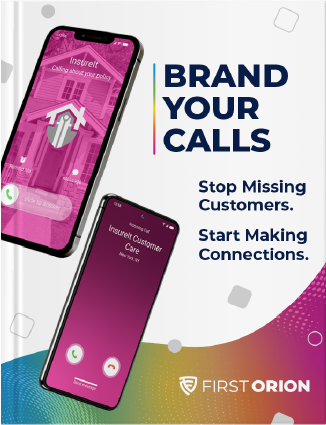Tuesdays with Jeff is an adapted interview from our Client Services Intern Christopher Gibbons and our President (and employee #1!) Jeff Stalnaker.
In the heart of our offices in Bellevue, Jeff Stalnaker sits down to chat about life as First Orion president, the state of the industry, and what he’s doing to take down scam calls altogether. I hit record on my iPhone and set it on the table, ready to take it all in. We chat briefly about his fitness routine (did he jog here? He’s so full of energy!) and how he likes to hit the gym before work each morning to kickstart his mind for the tasks of the day. It’s no wonder he needs the extra boost – Jeff is usually here far before I arrive and I see him still tapping away on the Surface Pro that’s standard issue to all employees well after I leave for the day. I ask him what motivates him to hustle that hard day after day.
“You know, Chris, what motivates me about what we do here at First Orion is my passion for protecting consumers. We’re protecting seventy, maybe eighty million consumers out there from unwanted calls, scammers, and fraudsters. I know when I go to the office every day I’m doing something to help that get better. It’s the passion for that protection that makes a difference.”
“So at the end of the day, it boils down to – you just want to help everyone?” I ask.
“Exactly. Absolutely. What we create here, being able to identify the scammers and what’s known in the industry as the spoofers, and tell consumers why their phone is ringing, I make a difference. Just as every employee at First Orion can make a difference in people’s everyday lives – It’s really hard to find a job where you can say that each and every day, yeah.”
He’s right about the employees. Over 100 employees in three offices around the world work every day to accomplish that dream. It’s easy to see why people are passionate about their careers at First Orion; when you feel like you make a difference not just at your company, but for the greater good, you’re more likely to be fulfilled by what you do. It’s just one of many reasons First Orion was named Great Place to Work certified for the third year in a row.
With great solutions, however, come great responsibilities. “How do you expect the scamming industry to fight back as solutions like ours continue to increase?” I ask him.
“Yeah, no, great question,” he answers. “What we’ve seen in the world of telecommunications in the past couple of years is astonishing when you think about the number of calls coming into a network service provider of a large phone company. It’s amazing. You know, three or four years ago the number of scammers was relatively low – when I say low, I mean less than 10% of the calls coming into a network were fraudulent behavior. Now, in 2018, we’re seeing 20, 25% and looking to the future you can expect closer to 30 or 35%.”
He pauses, likely in response to the look of shock on my face. He laughs and continues.
“People don’t want to answer their phones! They’re scared to answer because they don’t know who it is, and that creates a problem for legitimate businesses that are actually trying to reach you.”
Jeff launches into a long, complicated explanation of ‘number spoofing,’ the latest scam industry practice of pretending to call from legitimate numbers to trick consumers into answering. It’s a trend not limited to one carrier; one quick search of Twitter and I found hundreds of people complaining about eerily-similar numbers calling their mobile phones.
“Spoofing is growing rapidly,” Jeff says. “The phone companies have got to do something to protect their customers, and that’s what we help our carrier customers do – a solution to tell people to watch out for that particular call.”
He’s talking about Scam Likely, of course. The moniker developed to label probable scam calls in-network and on First Orion apps has gone slightly viral on social media, as unsuspecting customers noticed the calls start to come in last April. Scam Likely been meme-d, made into raps on Soundcloud, even turned into a Denver pop-up restaurant; but the most common question seems to be, who exactly IS this Scam Likely Character?
“When you think about the number of calls that people get today, most anyone you talk to can point to phone calls that look suspicious. Like Rachel from ‘card services’ or the ‘I.R.S.’ asking about a delinquent tax bill,” Jeff says animatedly. ” Or you won the lottery! Or one that’s going around most recently is that you failed to appear for jury duty and owe a couple of hundred bucks. People in the U.S. are generally intelligent people, and they still fall for the scams and gimmicks. I always point out that these scammers are not a bunch of people in a farmhouse making phone calls – these are a sophisticated group and an intelligent group of people that do a lot of work and analytics to find people to scam.”
There’s big money in scamming – even if only a small percentage of people actually answer the call, there are millions of dollars to be made. Just earlier this year the U.S. broke up a large I.R.S. phone scam ring, with stiff sentences for 21 conspirators and a round of indictments in India.
“Is this typically just older people who aren’t as tech savvy getting scammed?” I inquire, somewhat incredulously. I can’t imagine falling for one of these tricks.
“We want to think that scammers prey on the elderly, and while that’s certainly true, and perhaps they’re more susceptible to scammers, they’re going after young adults too. Student loan scams most recently! They’ll try to convince you to refinance your student loans, saying ‘Oh send us a few hundred bucks and we’ll take care of it for you.’ A lot of young kids come out of college with massive student loan debt, so a silver bullet that might solve that problem can be very enticing,” he answered.
In fact, according to First Orion survey data millennials experienced financial losses three times as often as baby boomers from phone scams. The survey found millennials were SIX times more likely than boomers to disclose personal information over the phone if the caller could verify the last four digits of their Social Security Number (SSN), a common tactic employed by phone scammers.
Color me surprised.
“So what are the advantages for carriers to have scam protection implemented into their network rather than an app?” I ask curiously.
“You know, we started with apps ten years ago!” Jeff exclaims. “Getting into the network with these big phone companies was quite challenging if you go back ten years. Scam calls weren’t that big of an issue for the executives that made those decisions, so we launched an application. It worked fine, but we always knew and believed the real answer was actually inside the network. Most recently, we’ve launched the technology on a very large carrier, inside the network, where we actually can see if a phone call looks suspicious and is up to fraudulent behavior. It’s quite amazing.”
“And that would work with any carrier?”
He nods. “Any phone company that really cares about their customers. A phone company with 80, 90, or 100 million customers has to look at all of their customers – not just provide a downloadable solution that may only fix the problem for a small percentage. All customers – whether they have a smartphone or one of those good ole’ flip phones that are still out there, whether they’re in a rural area or highly populated, you’ve gotta pay attention to the entire base.”
Nearly 60% of respondents in a recent First Orion survey said they would switch their phone carrier for one that offered protection against scammers. That statistic is not lost on Jeff.
“When companies worry they may lose customers because they’re not protecting them, I find it ironic – shouldn’t they be doing that already?”




